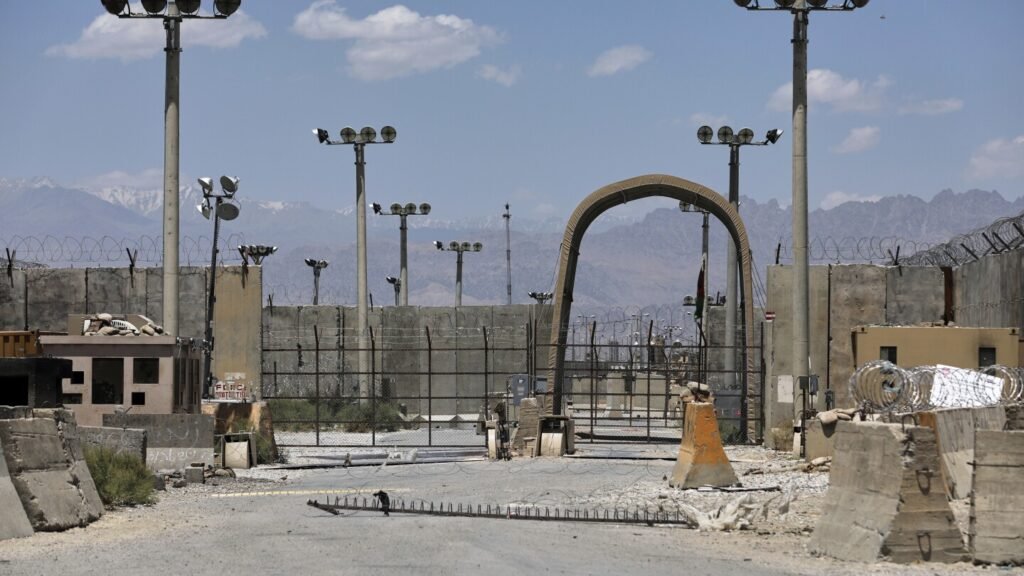Trump Aims to Reestablish U.S. Presence at Bagram Air Base in Afghanistan
Introduction
In a recent press conference in Washington, former President Donald Trump hinted at a possible U.S. military return to the Bagram Air Base in Afghanistan, highlighting its strategic significance in response to global challenges, particularly from China. This commentary marks a notable moment, considering the chaotic withdrawal from Afghanistan initiated under Joe Biden’s administration.
Background: The Withdrawal From Afghanistan
America’s military involvement in Afghanistan, which spanned two decades, culminated in a contentious exit in August 2021. Under Biden’s leadership, the U.S. withdrawal saw a swift collapse of the Afghan government and chaotic scenes of Afghans seeking refuge at Kabul airport. This chaotic exit not only left Bagram Air Base in Taliban hands but also drew immense criticism towards the current administration, portraying it as a significant setback for U.S. foreign policy.
Trump originally negotiated the terms of the withdrawal during his presidency, branding it as a strategic retreat, yet his critiques have since intensified as the implications of the withdrawal have unfolded. The tumultuous exit has often been cited by political opponents as a pivotal failure.
Trump’s Recent Statements
During a press conference with British Prime Minister Keir Starmer, Trump expressed his intentions about Bagram, stating, “We’re trying to get it back.” This comes at a time when the geopolitical landscape is being reshaped by China’s growing influence. Trump emphasized the necessity of reestablishing a footholdat Bagram to counteract this rival nation’s ambitions, especially given its proximity to key military facilities in China.
Linking Afghanistan to Global Security
Trump asserted that maintaining a military presence at Bagram is crucial for U.S. interests, particularly concerning national security vis-à-vis China. He described the base as "one of the most powerful bases in the world in terms of runway strength and length," suggesting that having access to such a facility could enhance U.S. operational capabilities in the region. He articulated, "You can land anything on there. You can land a planet on top of it."
The former president’s commentary underscores a larger narrative of U.S. strength and strategic positioning in the face of global threats. In Trump’s view, the Afghanistan withdrawal, handled under Biden, sent a negative message to adversaries like Russia and China, implying they may exploit perceived vacuums in U.S. foreign policy.
Reactions From the Taliban
Despite Trump’s bold claims about reclaiming Bagram, reactions from the Taliban were swift and dismissive. Zakir Jalaly, a representative from the Taliban Foreign Ministry, stated that they do not welcome a U.S. military presence, emphasizing that history shows Afghanistan has never accepted foreign troops. Jalaly pointed towards the potential for economic interactions between the U.S. and Afghanistan but firmly rejected military reinvolvement.
The Current Taliban Landscape
The Taliban, who regained power in 2021, face a myriad of challenges, including economic crises and internal dissension. Trump speculated that these challenges might make the Taliban more amenable to negotiating a U.S. presence at Bagram. However, it remains unclear if any formal conversations are currently happening regarding this issue. The Taliban’s stance indicates a firm rejection of any military dynamics reminiscent of past conflicts.
No Definitive Plans from the U.S. Government
As of now, there are no confirmed discussions or plans from the Biden administration or the Pentagon concerning the reestablishment of a U.S. military presence at Bagram. The White House did not immediately respond to inquiries about any strategic assessments or evaluations regarding the proposal. Given the complexities surrounding Afghanistan’s political landscape, any potential reentry for U.S. forces would involve intricate diplomatic negotiations.
Conclusion: A Divisive Subject
Trump’s remarks about the potential return to Bagram exacerbate an already divided discourse on U.S. foreign policy. As the geopolitical landscape continues to evolve, especially with the rising threats from nations like China, the question of military presence in Afghanistan remains a contentious topic. The challenges ahead are multifaceted, requiring careful deliberation from policymakers as they navigate the complexities of international relations and national security amidst lingering domestic and global implications.
For those looking to explore the implications of military strategy and foreign policy, conversations surrounding Bagram Air Base are a flashing reminder of the critical intersections between past decisions and present realities.


